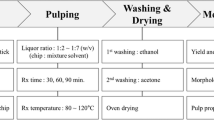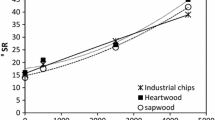Abstract
Eucalyptus globulus wood was subjected first to HCl–catalysed delignification with 70% acetic acid under conditions realizing an incomplete 3 × 3 × 3 factorial design (HCl concentration 0, 0.025 or 0.05%; temperature 120, 140 or 160 °C; reaction time 1, 2.5 or 4 h), and then to enzymatic hydrolysis. The hydrolysis kinetics conformed to both Ghose's empirical model and a biexponential equation. The biexponential fit implies the presence of both readily and reluctantly hydrolysed cellulose fractions, and the fitted coefficients show hydrolysis yield to depend largely on the digestibility of the latter. Multiple regression of performance variables on pulping conditions showed that neither the rate nor the extent of hydrolysis is greatest for pulps with minimum lignin or xylose contents; we attribute this circumstance to the condensation and precipitation of lignin under severe pulping conditions, which protects the cellulose of the pulp from enzymatic attack.
Similar content being viewed by others
Author information
Authors and Affiliations
Additional information
Received 20 June 1998
Rights and permissions
About this article
Cite this article
Vázquez, G., Antorrena, G., González, J. et al. The influence of acetosolv pulping conditions on the enzymatic hydrolysis of Eucalyptus pulps. Wood Science and Technology 34, 345–354 (2000). https://doi.org/10.1007/s002260000053
Issue Date:
DOI: https://doi.org/10.1007/s002260000053




